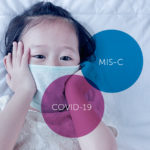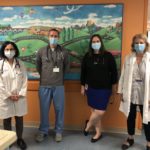MIS-C’s long-term effects on mental and neurologic health

Children and adolescents who have had multisystem inflammatory syndrome in children (MIS-C) after exposure to COVID-19 are recommended to have follow-up heart function testing. A new study from Boston Children’s Hospital suggests they should also be monitored for long-term neurologic and psychosocial complications.
“If parents are noticing changes in their child’s behavior or functioning, it could be related to MIS-C, and they should seek support,” says study leader Caitlin Rollins, MD, in the Department of Neurology and Cardiac Neurodevelopmental Program. Cardiologists and pediatricians who care for children after MIS-C should also ask about the child’s mental and neurologic health and refer them for evaluation and support if there are any concerns, she says.
Memory, motor, and mental health problems
The study, published in JAMA Network Open, enrolled 64 children and adolescents who had been hospitalized with MIS-C at Boston Children’s from November 2020 through November 2021. Six to 12 months after discharge, the children underwent neurological examinations and detailed neuropsychological assessments. For comparison, Dr. Rollins and her colleagues also assessed 44 siblings and nearby friends or relatives who had not had MIS-C.
Significantly more children with previous MIS-C had abnormal neurological findings than did children in the comparison group (25 versus 7 percent). Neuropsychological findings included impaired working memory; motor, coordination, and gait abnormalities; and higher rates of diagnosed ADHD, anxiety, or depression. Children with prior MIS-C were also more likely to have psychosomatic symptoms like headaches, chest pain, back pain, nausea, and fatigue and tended to report a lower quality of life.
Dr. Rollins notes that many of these symptoms could be chalked up to stress, including the stress of the COVID-19 pandemic and the way it upended children’s school and routines. Because the study included a comparison group that did not have MIS-C — but faced many of the same stressors — she believes the symptoms are likely MIS-C-related.
“When families learn the child’s symptoms could be related to MIS-C, they are reassured that others are experiencing it,” she says. “We hope this study will increase awareness.”
Related to adult ‘brain fog’?
Rollins is currently following the children with MIS-C for a second year and hopes to add MRI studies of the brain to see if MIS-C caused any structural changes.
In future studies, she hopes to explore how MIS-C predisposes children to neurobehavioral complications and what these children might have in common with adults who report brain fog after COVID-19. As a committee member on the large, federally-funded RECOVER study, she has reviewed data from children who have had COVID-19 or MIS-C as well as adults with long COVID.
“These conditions are very intertwined,” says Rollins. “The acute illness is very different — children with MIS-C are very sick and often need ICU care, while adults may have mild acute cases of COVID-19 but have lingering brain fog. Both could be part of the same spectrum and the same mechanisms could be underneath.”
Learn more about the Cardiac Neurodevelopmental Program at Boston Children’s.
Related Posts :
-

Lingering health problems in children and youth after COVID-19 and MIS-C
More than one in four children and adolescents hospitalized with COVID-19 or multisystem inflammatory syndrome in children (MIS-C) had persisting ...
-

Neurological involvement common in kids and teens with acute COVID-19 and MIS-C
In the largest study of its kind, researchers from Boston Children’s Hospital found neurological involvement in 22 percent of children ...
-

MIS-C: The tip of an iceberg? Looking at cardiac care for this rare syndrome
In the early days of the COVID-19 outbreak, it seemed that children were far less likely to develop serious problems ...
-

COVID-19 and a serious inflammatory syndrome in children: Unpacking recent warnings
On April 27, an alert circulated from the U.K. about multi-system inflammatory disease in children with COVID-19, based on a ...





